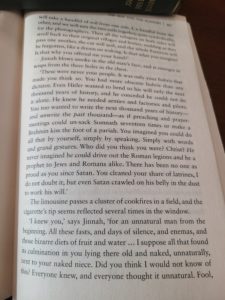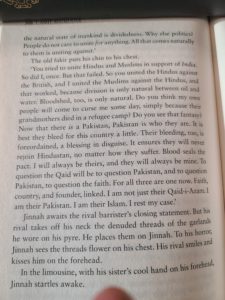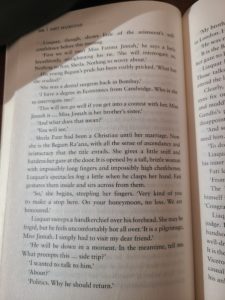
Amit Majmudar, a Gujrati from Ohio (he is the poet laureate of Ohio and if you have not read his poetry, do look it up, he is good) already wrote one novel about partition (called, appropriately enough, partition) but as he says in the epilogue, his views continue to evolve and another book was needed. And what a book it is; a riveting page-turner that tells the story of partition through the parallel lives of Jinnah and Gandhi, all wrapped up in very tight and carefully thought out writing, with quotes from Plutarch, the Gita and other works used as needed.
Amit has done his research and the novel is rich in historic detail and apt anecdotes. Some dialog has obviously been imagined, but wherever possible the words they speak are the words various histories and memoirs have already recorded. What emerges is a very striking portrait of two very different Gujratis who, for better AND for worse, determined the fate of British India and of the largest population group in the world (Indians in united India would exceed the population of China by hundreds of millions). Jinnah is the hugely talented and ambitious anglicized lawyer who became the most successful barrister in India before entering politics. An upper crust “brown Englishman”, he has great success politicking within the new Indian elite, but is sidelined by the rise of Gandhi and his popular politics (deftly captured in a scene where the newly arrived Gandhi is invited to a meeting of the Gujrati association which Jinnah chairs; after Jinnah has finished his perfectly modulated English speech, Gandhi opts to speak in Gujrati and the crowd goes wild. A taste of things to come.
Jinnah gradually sours on the idea of united India and is reborn as the messenger of Muslim separatism and the father of Pakistan. Gandhi has a slower start as a lawyer, but in South Africa he has found a new vocation: mahatma or great soul. Unlike Jinnah, he has world historical and prophet-level ambitions, and his impact is huge, yet he also fails at the most important task he set himself (winning independence for a united and spiritually elevated India), while Jinnah gets his moth-eaten Pakistan, but then he also gets to say “My God, what have I done?” when he sees the carnage unleashed by his campaign. Gandhi heads towards his meeting with Godse, while Jinnah’s tuberculosis finally finishes him while he lies in a hot ambulance that has broken down on the main road in Karachi. Amit is a poet and he brings a poetic touch to these events; the description may be brief, but it covers a LOT of ground.
The book also does a fine job of bringing Fatima Jinnah out of the shadows. She is the “white wolf” by Jinnah’s side, Pakistan’s virgin mother. There are many excellent books about partition, but almost none pay enough attention to Fati. Amit rectifies that error. Short but telling descriptions introduce all the other main characters of this tragedy, from Nehru and Patel to Liaqat and Suharwardy and Mountbatten and Edwina. And while it is not a very thick book, it manages to fit in almost every important event that happened along the way. Jallianwala bagh, the salt march, the Pakistan resolution, Direct Action, partition riots, it is all there, and while the coverage is not very detailed, a lot of thought has been put into every vignette, so they convey a lot more than you might expect at first glance. Unfortunately this tight pacing and compact descriptions also mean that the reader is expected to have a general idea of what went on and some of the clever literary maneuvers are best appreciated when you already know something about the events in question. Still, even those without prior knowledge will get most of it, while knowing more already will help you appreciate it more. Well worth a read.
Dream part 1


I dont believe in “Great Man” view of history , except for religions which by definitions are attached to certain individuals.
Neither Gandhi or Jinnah are leaders on their own, its the people below who thrust them to the top. In them, we learn more about the people who allowed them to rise to the top.